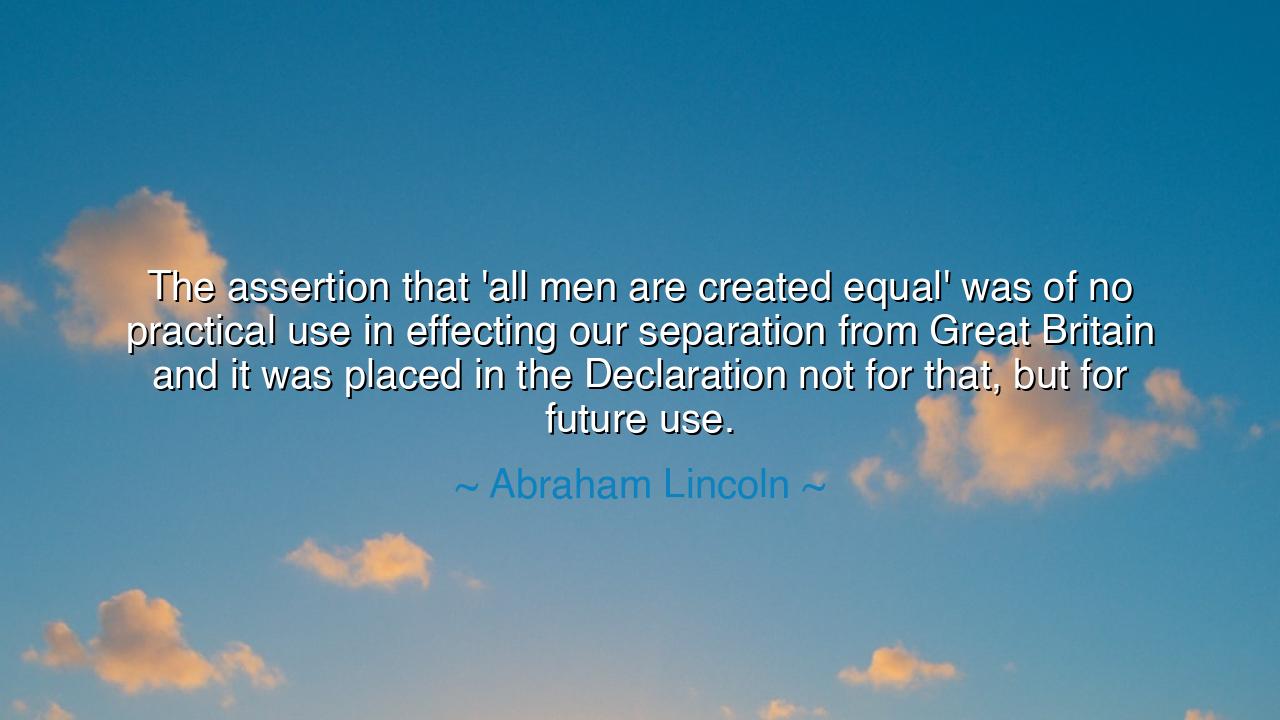
The assertion that 'all men are created equal' was of no
The assertion that 'all men are created equal' was of no practical use in effecting our separation from Great Britain and it was placed in the Declaration not for that, but for future use.






"The assertion that 'all men are created equal' was of no practical use in effecting our separation from Great Britain and it was placed in the Declaration not for that, but for future use." These words spoken by Abraham Lincoln reveal a profound truth about the nature of political vision, the power of words, and the slow, steady work of justice. The Declaration of Independence, with its bold statement of equality, was not merely a document to justify the colonies' break from Great Britain, but a declaration that would serve future generations. Lincoln’s insight teaches us that sometimes the most powerful principles are not intended for immediate action but are planted for the seeds of change that will one day come to fruition.
When the Founding Fathers wrote that "all men are created equal," it was not yet a principle that applied to all people in the new nation—especially enslaved Africans, women, and many other marginalized groups. At the time, this declaration was more of a philosophical ideal than a practical reality. Equality was an abstract concept, not yet realized in law or in practice. But, as Lincoln recognized, the words carried with them the seed of a future revolution. The principle of equality, once planted, could not be erased. It would continue to grow in the hearts and minds of those who sought justice, and in time, would become a foundational ideal that demanded fulfillment.
The American Revolution was not fought for equality; it was fought for freedom from British rule. The colonists sought self-governance, not an end to slavery, not universal suffrage, and not equal rights for all people. Yet, as Lincoln understood, the Declaration’s words—"all men are created equal"—were not for the moment of separation from Britain, but for the future struggle that would unfold over generations. It was a promise made, an ideal placed before the people, knowing that the work to fully embody this equality would take years, decades, even centuries.
In Lincoln’s era, the promise of equality still seemed distant. The United States was embroiled in a civil war, a brutal conflict over the very existence of slavery and the moral question of equality. The Emancipation Proclamation, which Lincoln issued, was an attempt to fulfill the promise of the Declaration of Independence by freeing enslaved people in the Confederacy. Yet, even with this monumental step, true equality—political, social, and economic—remained elusive. Lincoln knew that the battle for freedom was only one chapter in a long story. The assertion in the Declaration of Independence would continue to echo through the centuries, propelling the nation toward ever-greater justice.
The struggle for equality would continue to unfold long after Lincoln’s time, as women’s suffrage, civil rights, and gay rights movements fought to bring the promise of equality to all. Each of these movements, whether in the 19th century or the 21st century, has been a testament to the power of the Declaration’s words, which, though not fully realized at the time, planted the seeds for change. Even now, the nation grapples with issues of racial injustice, economic inequality, and political rights. But Lincoln’s insight remains a beacon: the ideals of equality, once written, will not rest until they are fulfilled. They remain a standard to which we must constantly aspire.
Consider the example of Martin Luther King Jr., whose leadership in the Civil Rights Movement was a fulfillment of Lincoln’s prophecy. King’s words, like those of Lincoln, appealed to the moral ideals of the Declaration of Independence. He called for a nation where people were judged not by the color of their skin but by the content of their character—a direct appeal to the ideal of equality that had been promised but not fully realized. King’s “I Have a Dream” speech echoed the spirit of the Declaration, urging the country to live up to its own ideals. His struggle was not just about ending segregation but about ensuring that the nation would fully embrace the idea that all men—and women—are truly created equal.
The lesson from Lincoln’s words is clear: principles like equality are not always meant to be immediately realized; sometimes, they are planted as a vision for the future. The words of the Declaration of Independence were an offering to future generations, a call to action that would echo long after the ink dried on the document. We are the inheritors of that promise, and it is our task to continue to work toward making those ideals a living reality for all people. Whether in our communities or in the larger world, we must never forget that the work of justice is ongoing, and that the ideals of liberty and equality are worth striving for, no matter how long it takes.
In our own lives, this means understanding that change often requires patience, perseverance, and a long-term vision. The struggle for equality and justice is not always won in a single moment, but through the efforts of those who keep the dream alive. We are called not only to recognize the work of those who came before us but to carry forward their mission—to take the ideals of freedom and equality and continue to fight for their full realization. Whether in politics, in social movements, or in our own personal actions, we must work to embody the values we hold dear, knowing that the future we create will outlast our time and carry our legacy to future generations.






AAdministratorAdministrator
Welcome, honored guests. Please leave a comment, we will respond soon